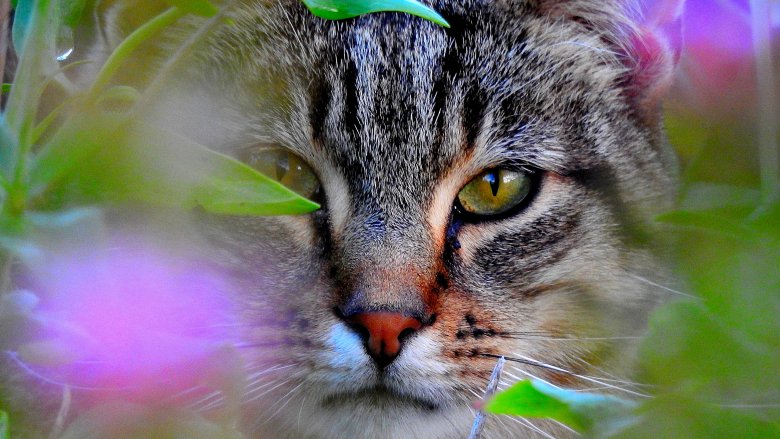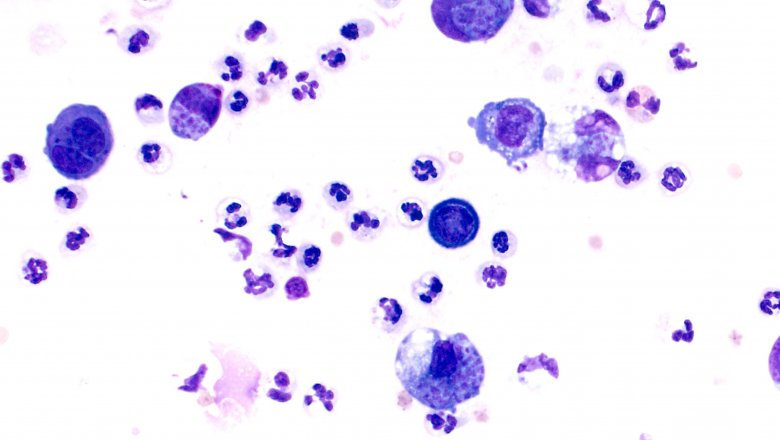The Cat Parasite That Can Control Your Mind
Cats have a reputation as being standoffish and aloof, when they're really just adorable, loving little floofballs with some serious trust issues. Once you win that trust you'll never have a cold lap again, but talk to cat haters and you might hear all that love comes at a price: brain-dwelling parasites and the potential for some mind control, Bond villain-style.
Don't listen to those people. The mind control they're talking about is actually the work of a tiny little cat parasite called Toxoplasma gondii, and it's such a weird — but fascinating — thing we still don't know exactly how it all works. We do know Fluffykins isn't guilty of anything except living in the circle of life, and he's not actually controlling your mind.
Something else is. Maybe. A bit. It's complicated, so let's talk about why having a cat parasite hibernating in your brain might be a good thing, and why there's absolutely no reason to live in fear of cats. (Except for when they stare at nothing. They're probably looking at ghosts, and then you should be very afraid.)
The parasite in your brain
You've probably heard cats are one of the major carriers of Toxoplasma gondii (pictured), the single-celled parasite that's causing all the fuss. More specifically, the parasites live in cat poops, but that's not the only place you can find it. You can also pick it up by eating contaminated meat, and the CDC says it's usually pork, venison, and lamb, although any undercooked meat is a potential risk. You can also come in contact with it in the soil, on unwashed fruits and vegetables, or on food prepared in a kitchen where cross-contamination is the norm.
It's almost terrifyingly common. The CDC says around 60 million U.S. residents are living with this little hitchhiker, and according to The Atlantic, researchers estimate about a third of the world's population is infected. In other words, you might as well name yours now, because there's a good chance you've got it. (And there are tests that can detect it, if you're curious.)
You probably wouldn't know you've caught it. When you're first infected, you might come down with what feels like a bit of a cold. That passes, and your immune system keeps it in line. It's only if your immune system is seriously compromised that it might start creating some havoc, and if it does, it'll attack your brain and eyes. Yikes. It's estimated to kill as many people as malaria does.
Sometimes, the voices are real
The story of how we discovered Toxo's powers is pretty brilliant, and it's proof science happens in weird ways. In the 1990s, a Czech scientist named Dr. Jaroslav Flegr became convinced there was a parasite living in his brain, influencing his personality and guiding his decisions. Ha, crazy scientist, right? Not this time.
Flegr told The Atlantic his work began when he read a book on the flatworm, which invades ant nervous systems and paralyzes them to make them easy prey for sheep — the worm's final destination. It made him look at his own behavior, and he realized he was developing a tendency to do some nutty stuff. He walked into traffic, crossed busy streets without looking, and even spoke openly about his dislike of the ruling communists. Gunfire didn't bother him, and he realized that's not normal.
He went to Charles University in 1990 and joined an in-depth study into Toxo. There, he was able to examine infected individuals and the parasite's life cycle. Essentially, the only place the parasite can reproduce is inside a cat. Once it leaves the cat, it needs to get back in — or die trying. Since humans aren't usually prey for cats, most of us are a "dead end" host ... or are we?
Flipping the fear switch
By the time Flegr got on board with research, they'd already discovered something weird about infected rats. They were more active, less cautious, and more likely to wander into open spaces. Things got even weirder when Joanne Webster, an Imperial College London parasitologist (via The Atlantic) introduced the scent of a cat. She put infected rats into enclosures that had different areas treated with different scents: cat urine, rabbit urine, and the rat's own smell. The rats became so obsessed with the cat odor that researchers dubbed it "fatal feline attraction."
"Rats aren't people!" you're shouting. But chimpanzees are more human than some people you probably know, and in 2016 researchers in Gabon presented both infected and non-infected chimps with the smell of their natural predator, the leopard. Infected chimps were all about investigating the smell while non-infected counterparts weren't so keen, but when scientists exposed them to the smells of lions and tigers — not their natural predators — there was no difference (via the Independent).
The conclusion is a weird one: The cat parasite is modifying behavior to make it more likely the host will get eaten by a cat predator. Another piece of the puzzle was provided by research from the National Institutes of Health in 2011, when researchers found the presence of Toxo in rats activated parts of the brain linked to sex. Instead of causing fear, the smell of cats turned the rats on. Fatal attraction, indeed.
Playing in traffic
Toxo's influence on human behavior wasn't documented until 2002, when Dr. Flegr found (via Vice) some evidence the parasite was modifying human behavior just like it was guiding rat and chimpanzee hosts into the jaws of their feline predators. One behavioral difference he noticed in himself was his tendency to become oblivious to car horns, and he also started crossing the street without looking. So it's not surprising that he found his first bit of evidence by analyzing traffic patterns.
Infected drivers were around 2.6 times more likely to find themselves picking themselves up off the pavement after being in a car accident. Flegr paralleled that human version of risk-taking behavior with that of the rats and chimps, and that's a big deal. It was the first indication the parasite we thought was harmless and completely under our control was, in fact, affecting us. That's some serious conspiracy theory-level stuff.
Once, we were prey
Vice sat down with Flegr to discuss his work in-depth, and he had some fascinating things to say about why we're a part of this cycle at all. At a glance, it doesn't seem to make much sense. When's the last time you heard something about someone getting eaten by a cat? (Aside from the occasional rumor someone's housecat ate them after they died, which has happened very rarely.)
But Flegr says we were once a completely viable vehicle for getting Toxo back into cat hosts and, in some parts of the world, we still are. He suggests that thousands of years ago, those eyes glowing in the dark were a very real danger, and Toxo's contribution to our poor life choices was designed to make us more likely to be eaten by that lion or tiger. Flegr says he's found evidence in personality questionnaires given to infected and non-infected people, and says infected people are way less fearful of things like the forest or the deepest, darkest night. In other words, they're prime pickin' for big cats hunting at night.
The gender gap
Flegr has also found Toxo doesn't change all human behavior in quite the same way. He told Vice that infected women were more likely to become more outgoing, friendly, and moral (although, he says, not more promiscuous). Infected men, on the other hand, became more guarded, more prone to jealousy, and more likely to break or bend the rules.
Those reactions are pretty much polar opposites, but Flegr thinks he knows what's going on. He says it's possible the parasite is interacting with the way people react to chronic stress, and the opposite personality changes seen in infected people aren't that strange at all. He says since men tend to withdraw during times of stress and women tend to reach out, it's possible the parasite is putting the host under an extreme amount of stress, and those around them are just seeing the outward manifestations of that.
It could be good ... or bad
Absolutely none of this is sounding good, right? The idea we're not in control of our own emotions or behavior is a terrifying prospect, and it's why some people swear by tinfoil hats. But more research has suggested it's almost impossible to tell how it's going to impact us.
Ann-Kathrin Stock from the University of Dresden (via The Atlantic) puts it like this: "It interferes with brain chemistry, but the parasite itself doesn't intend to harm someone. It always acts by the same mechanism. ... It's just that humans are very rarely prey to cats. That doesn't help its goal."
And that means at the end of the day, the effects of the parasite on humans is pretty scattershot. There have been links to an increased likelihood of the development of mental illness, but Stock's work also shows there's the potential for some good changes, too. Her team found infected people had faster response times when they needed to react to changing stimuli, and there's also evidence Toxo increases the amount of dopamine — that's the feel-good chemical — in the brain. In rats, that's specific to the pathway that attracts them to cats, but in humans it's more complicated. The entire system gets flooded, and different people can have different reactions.
A hostile hitchhiker
Researchers have actually uncovered the process Toxo uses to infect what's essentially an interim host. Melbourne scientists (via Neuroscience News) found the parasite hijacks a healthy, human cell to create a sort of bunker that provides it with everything it needs to survive in a dormant state. The cell releases proteins into the human cell, which then manipulate a person's chemistry to stockpile starches — think of a bear hibernating for the winter.
Fortunately, our immune systems keep on top of this sort of thing, at least, in healthy individuals. Science is still working on figuring out some of the precise mechanisms, but they do know a healthy immune system will form cysts around little Toxo pockets. Joanne Webster of Imperial College London (via The Atlantic) says it's possible the increased levels of dopamine come because of the cysts and an increase in one particular enzyme that's key in both the development of the cysts and dopamine. What kind of impact the cyst has on the brain tissue around it isn't entirely clear — not yet, at least.
There are other mind-controlling creatures out there
As if one mind-controlling parasite isn't bad enough, it's not a precedent-setting creature by any means. Let's take a look at just one of the others, a parasitic wasp called Polysphincta gutfreundi. Scientists from the Smithsonian did a series of experiments to see what kind of effect the wasps had on the life cycle of orb-weaving spiders, and the results were downright bizarre.
Researchers found the wasps have a bizarre way of disguising their cocoons. Basically, the females lay their eggs on the spider and when they hatch, the larvae begin life by puncturing the spider's skin and feeding on their host. During the week they're hitching a ride on the spider, scientists think they're also injecting it with a mind-hijacking chemical that influences the way they spin their webs. Instead of the delicate webs they usually make, they start spinning webs that look like they've been influenced by a bad LSD trip. Once the larvae matures a bit and the web is done, it kills the spiders, tosses it aside, and builds a cocoon in the center of the web. The wasp matures, hatches, and the cycle starts all over again. Never thought you'd feel sorry for a spider, did you?
No, it doesn't make you crazy ... probably
One of the things you may have heard about the Toxo parasite is it makes people more prone to mental illness, particularly schizophrenia. That's terrifying, but a 2016 study from Duke University (via Discover) looked at more than 1,000 people and found there was no link between infection and mental illness. Around 28 percent of their sample group (which was made up of people born in New Zealand in the early 1970s) were infected, and ultimately showed no correlation between infection and IQ, depression, schizophrenia, driving offenses, accident claims, or criminal convictions. Other studies — including one with a sample pool of 7,440 individuals — did not support a link between Toxo infection and mood disorders.
University College London (via Medical Daily) has also looked at the claim that when cats are present in the household of a pregnant woman or child, the child is more susceptible to mental illness down the road. Good news for cat lovers: across the 5,000-person sample pool, there was no link found between cat ownership and mental illness or impairments. Vindicated!
Keep your cat, the CDC says it's ok
Now, to your cat's role in all of this. It's undeniable that they play a vital role in the life cycle of this weird cat parasite, but according to the CDC, there's absolutely no reason to give up your cat — even if someone in the house is or is planning on becoming pregnant. They do recommend pregnant women stop cleaning the litter box, though. Who says there are no perks to being pregnant?
They also say there's next to no chance of picking up the parasite by even petting a cat who's infected, as it's not transmitted by fur. All this is a great reason to keep your cats inside, as the CDC says they become infected by eating small animals that carry the parasite. Keep them inside, and the problem is nonexistent. And you can absolutely start that now. Because the cat is part of Toxo's life cycle, they can pass along the infection only for about two weeks after becoming infected themselves. The parasite itself dies between one and five days after being passed out of the cat's system, so you can't blame Fluffykins for this one.











